| Listing 1 - 10 of 61 | << page >> |
Sort by
|
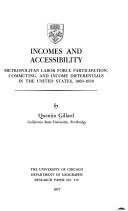
ISBN: 0890650829 9780890650820 Year: 1977 Volume: 175 Publisher: Chicago (Ill.): University of Chicago. Department of Geography
Abstract | Keywords | Export | Availability | Bookmark
 Loading...
Loading...Choose an application
- Reference Manager
- EndNote
- RefWorks (Direct export to RefWorks)
Commuting --- Income distribution --- -Income distribution --- Transportation --- Telecommuting --- Commuting - United States --- Income distribution - United States
Book
ISBN: 0385543093 Year: 2020 Publisher: New York : Doubleday,
Abstract | Keywords | Export | Availability | Bookmark
 Loading...
Loading...Choose an application
- Reference Manager
- EndNote
- RefWorks (Direct export to RefWorks)
"In nearly every realm of daily life--from health care to education, highways to home security--there is an invisible velvet rope rising, separating Americans into two radically different experiences of life. On one side of the velvet rope is a friction-free existence where, for a price, needs are anticipated and catered to. Red tape is cut, lines are jumped, appointments are secured, and doors are opened. On the other side of the rope, friction is practically the defining characteristic, with middle-and working-class Americans facing a Darwinian fight for an empty seat on the plane, a place in line with their kids at the amusement park, a college acceptance, a hospital bed. We are all aware of the gap between the rich and everyone else, but when we weren't looking business innovators stepped in to exploit it, shifting services away from the masses and finding new ways to serve the privileged. New York Times business reporter Nelson Schwartz offers a behind-the-scenes tour of the velvet rope economy and those who created it: the ship-within-a-ship on Norwegian Cruise Lines that saves the best views for the wealthy, a special pager for donors that reaches San Francisco's top cardiologist, a $4,000-a-night maternity suite, firefighters who save one home but not the house next door. And he shows the toll of velvet rope innovation on the rest of us: long waits for an ambulance, packed highways, school athletics that are pay to play. What's more, as decision-makers and corporate leaders increasingly live on the friction-free side of the velvet rope, they are less inclined to change--or even notice--the barriers everyone else must contend with"--
Income distribution--United States. --- United States --- Economic conditions --- Income distribution --- Affluent consumers --- Classism
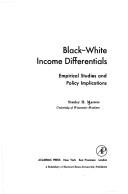
ISBN: 012479050X 9780124790506 Year: 1975 Publisher: New York
Abstract | Keywords | Export | Availability | Bookmark
 Loading...
Loading...Choose an application
- Reference Manager
- EndNote
- RefWorks (Direct export to RefWorks)
Social stratification --- Sociology of minorities --- Income --- United States --- Income distribution --- Discrimination --- Income distribution - United States --- Discrimination - United States --- United States of America
Book
ISBN: 069103219X 1306984971 0691601542 0691631204 1400863597 9780691032191 Year: 1993 Publisher: Princeton, New Jersey : Princeton University Press,
Abstract | Keywords | Export | Availability | Bookmark
 Loading...
Loading...Choose an application
- Reference Manager
- EndNote
- RefWorks (Direct export to RefWorks)
America is entering a new age of economic discord, warns Robert E. Kuenne. In addition to a panoply of other structural economic troubles, the nation must now confront unprecedented demands for the kind of "distributive justice" that will meet the needs of the elderly, handicapped, and impoverished. Furthermore, American society faces the pressing problems of the disadvantaged with no explicit code of economic justice. Claims to various kinds of government entitlements are based increasingly on appeals to "economic justice," but no real national agreement exists on what that expression means. In this ambitious work, Kuenne sets out to remedy this want of consensus.After an extensive evaluation of earlier thinking about distributive justice, Kuenne proposes a new theory, "dualistic individualism," that is consistent with the American ethos of political and economic liberalism. He then frames a formal Bill of Economic Rights and Obligations, which defines proper governmental conduct in the economic terrain as the American Constitution does in the political. Defending a form of governmental policy that strikes a balance between the egoistic and compassionate elements of American individualism, Kuenne also considers the practical tasks of program implementation, and goes on to assess the feasibility of meeting concrete redistributive goals over the next thirty years. His thorough investigation of one of the country's most urgent predicaments could do much to stimulate debate over the ad hoc and unprincipled distributive policies that now prevail in the United States.Originally published in 1993.The Princeton Legacy Library uses the latest print-on-demand technology to again make available previously out-of-print books from the distinguished backlist of Princeton University Press. These editions preserve the original texts of these important books while presenting them in durable paperback and hardcover editions. The goal of the Princeton Legacy Library is to vastly increase access to the rich scholarly heritage found in the thousands of books published by Princeton University Press since its founding in 1905.
Justice sociale --- Rechtvaardigheid [Sociale ] --- Social justice --- Sociale rechtvaardigheid --- Income distribution --- Social justice. --- United States --- Economic conditions --- Economic conditions. --- Equality --- Justice --- Income distribution - United States.
Book
ISBN: 9781107400368 9780521514583 0521514584 9780511576225 9780511508486 0511508484 9780511504891 0511504896 1107190223 9781107190221 0511509146 9780511509148 9786612058608 6612058609 0511507038 9780511507038 0511576226 1107400368 Year: 2009 Publisher: Cambridge Cambridge University Press
Abstract | Keywords | Export | Availability | Bookmark
 Loading...
Loading...Choose an application
- Reference Manager
- EndNote
- RefWorks (Direct export to RefWorks)
This book revolves around one central question: do political dynamics have a systematic and predictable influence on distributional outcomes in the United States? The answer is a resounding yes. Utilizing data from mass income surveys, elite surveys and aggregate time series, as well as theoretical insights from both American and comparative politics, Kelly shows that income inequality is a fundamental part of the US macro political system. Shifts in public opinion, party control of government and the ideological direction of policy all have important consequences for distributional outcomes. Specifically, shifts to the left produce reductions in inequality through two mechanisms - explicit redistribution and market conditioning. Whereas many previous studies focus only on the distributional impact of redistribution, this book shows that such a narrow strategy is misguided. In fact, market mechanisms matter far more than traditional redistribution in translating macro political shifts into distributional outcomes.
-339.220973 --- Income distribution --- Equality --- United States --- Economic policy --- Economic policy. --- Social Sciences --- Political Science --- Income distribution - United States --- Equality - United States --- United States - Economic policy
Book
ISBN: 198487988X Year: 2020 Publisher: New York : Penguin Press,
Abstract | Keywords | Export | Availability | Bookmark
 Loading...
Loading...Choose an application
- Reference Manager
- EndNote
- RefWorks (Direct export to RefWorks)
"When Gene Sperling was in charge of coordinating the shaping and execution of the US government's economic policy in the Obama White House, he found himself surprised and dismayed when serious people in Washington worried out loud to him that the Obama focus on health care was a distraction because it was "not focused on the economy." How, he asked, was millions of Americans' fear that they were a single pink slip or a loved one's serious illness away from financial ruin somehow not considered an economic issue? To him, it was just one more example of a more profound truth he witnessed in his many years in our national economic debate: that when it comes to America's economic policy, there is too little focus on what the end goal should be. Too often, he found that our economic debate confused ends and means; that we measured economic success by metrics like GDP instead of whether the economy was succeeding in lifting up the sense of meaning, purpose, fulfillment, and security of people. Too often, he found debates framed by old divisions or pro-market ideology that increasingly failed to capture whether economic policy was fostering exploitation, economic insecurity, and disillusionment that were too often invisible within our current framework. Now more than ever, at a moment when the very capacity of modern capitalism to avoid accelerating inequality, a hollowed-out middle class, and structural poverty is being questioned, we need to step back and reflect on our ultimate goals. Economic Dignity is Sperling's effort to do just that - to frame our thinking about the way forward in a time of wrenching economic change. His argument combines moral and intellectual seriousness with actual high-level policy experience. Economic dignity, Sperling maintains, can be seen as resting on three pillars. The first: the capacity to care for family without economic deprivation denying people the capacity to experience its greatest joys - the birth of one's children, the companionship of a loving partner, the love of family and friends, the fulfillment that comes from providing. The second: the right to the pursuit of potential and purpose, including the right to first and second chances - the right to a life of active striving. The third: economic participation with respect and without domination and humiliation. All three pillars are rooted in the highest and most noble values of the American project. But getting there is the rub, and in Economic Dignity, Sperling offers paths that policymakers and citizens can follow for years to come. As he puts it, if you live in times when major steps forward are needed, it is important to be clear on your destination - or at least to know the North Star that is guiding you. His answer, in two words, is economic dignity"--
Book
ISBN: 128302943X 9786613029430 0844743720 Year: 2010 Publisher: Lanham : AEI Press,
Abstract | Keywords | Export | Availability | Bookmark
 Loading...
Loading...Choose an application
- Reference Manager
- EndNote
- RefWorks (Direct export to RefWorks)
Studies of wage and income inequality among U.S. citizens over the past thirty years have engendered the common wisdom that the rich are getting richer and the poor are getting poorer. But is it really that simple? In Inequality in Living Standards since 1980 the authors contend that the evolution of income and wage inequalities offers only a partial picture of changes in prosperity in recent decades.
Consumption (Economics) - United States. --- Consumption (Economics) --United States. --- Cost and standard of living - United States. --- Cost and standard of living --United States. --- Foreign workers - Government policy - United States. --- Income distribution - United States. --- Income distribution --United States. --- United Staes - Emigration and immigration. --- Unskilled labor - United States. --- Cost and standard of living --- Income distribution --- Consumption (Economics)
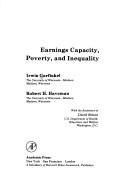
ISBN: 0122758501 9780122758508 Year: 1977 Publisher: New York Academic Press
Abstract | Keywords | Export | Availability | Bookmark
 Loading...
Loading...Choose an application
- Reference Manager
- EndNote
- RefWorks (Direct export to RefWorks)
Economic sociology --- Income distribution --- Poverty --- 330.564 --- Destitution --- Wealth --- Basic needs --- Begging --- Poor --- Subsistence economy --- Verdeling van nationaal inkomen. Inkomensverdeling --- Poverty. --- 330.564 Verdeling van nationaal inkomen. Inkomensverdeling --- Income distribution - United States
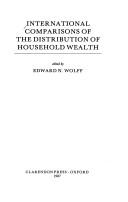
ISBN: 0198285116 9780198285113 Year: 1987 Publisher: Oxford Clarendon
Abstract | Keywords | Export | Availability | Bookmark
 Loading...
Loading...Choose an application
- Reference Manager
- EndNote
- RefWorks (Direct export to RefWorks)
National wealth --- Income distribution --- Wealth --- Congresses --- Income distribution - Europe - Congresses --- Income distribution - United States - Congresses --- Income distribution - Canada - Congresses --- Wealth - Europe - Congresses --- Wealth - United States - Congresses --- Wealth - Canada - Congresses
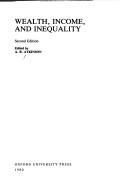
ISBN: 0198771444 9780198771449 Year: 1980 Publisher: Oxford Oxford university press
Abstract | Keywords | Export | Availability | Bookmark
 Loading...
Loading...Choose an application
- Reference Manager
- EndNote
- RefWorks (Direct export to RefWorks)
Income distribution --- Wealth --- 330.564 --- Verdeling van nationaal inkomen. Inkomensverdeling --- 330.564 Verdeling van nationaal inkomen. Inkomensverdeling --- Income distribution - Great Britain --- Income distribution - United States --- Wealth - Great Britain --- Wealth - United States
| Listing 1 - 10 of 61 | << page >> |
Sort by
|

 Search
Search Feedback
Feedback About UniCat
About UniCat  Help
Help News
News